
7 Core Stability Exercises
Developing core strength is essential for everyday health and well-being, as a strong core protects the spine, reduces back pain, enhances movement patterns, and improves balance, stability and posture.
There are many methods for developing core strength, as well as various pieces of equipment that assist in that development. However, there are plenty of exercises that require only body weight or basic equipment. The most important thing to remember when training the core is to avoid using momentum and instead perform each exercise with awareness so that the core is actually braced or engaged.
The following seven core stability exercises can be added to your current workout routine. If some of these exercises feel too challenging, try the regressed version given in italics. If the featured equipment is not available, use your own body weight.
BOSU Bird Dog
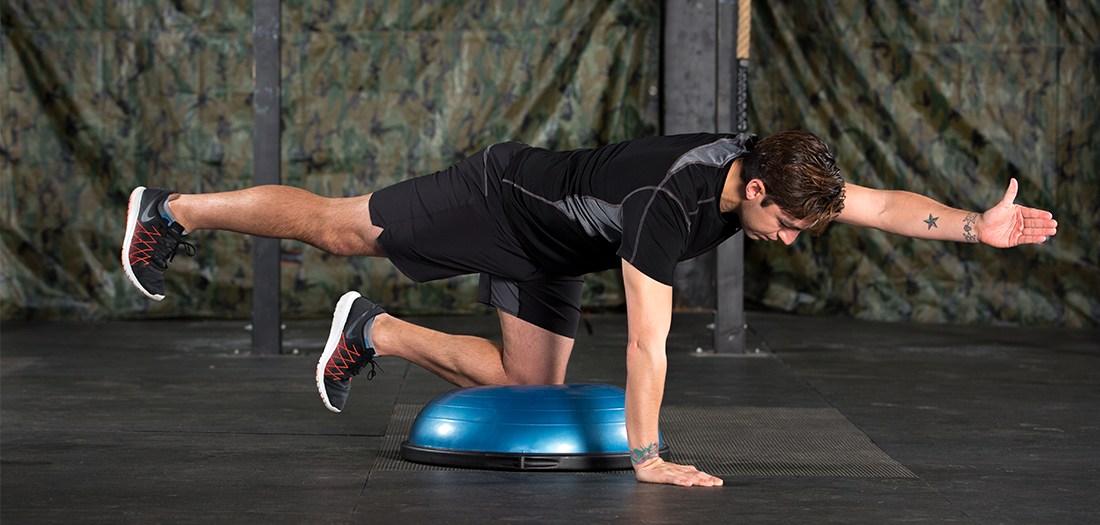
Focus: Core stability
How to Perform: Set your right knee on the center of the dome and place both hands on the floor underneath the shoulders. Extend the left leg behind you to hip height; keep the foot flexed. Raise the right arm to shoulder height with your thumb facing the ceiling. Hold for 20 seconds and switch sides.
Regression: Perform the exercise on the floor.
Supine Toe Taps
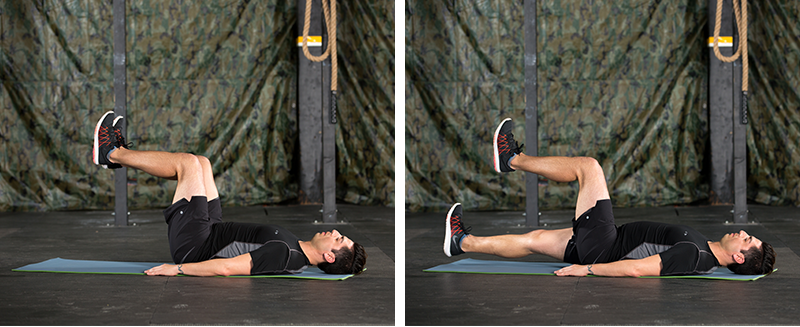
Focus: Core stability
How to Perform: Lie on your back and place your arms by your sides. Engage the abdominals and draw the navel toward your spine. Lift the knees to 90 degrees. On a two-count, lower your right foot to touch the floor, and on a two-count, return it back to 90 degrees. Perform the same movement with your left leg and continue to alternate tapping the right and then the left foot onto the floor. Perform 10 reps on each leg.
Regression: Keep your feet on the floor, and slide your heel on the mat, alternating legs.
Marching Hip Bridge
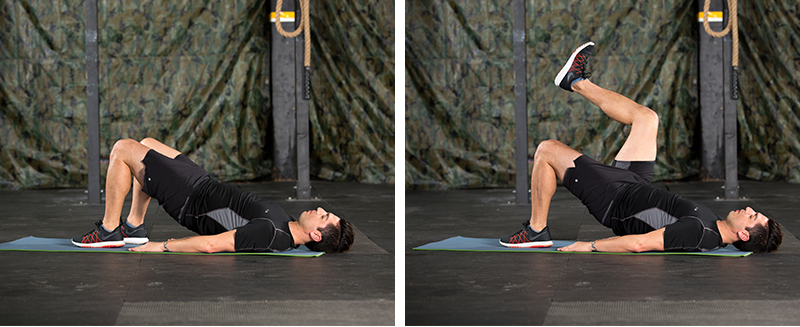
Focus: Lumbo-pelvic stability
How to Perform: Lie on your back and place your hands by your sides. Lift the hips and hold a hip bridge. Lift the right foot off the floor to 90 degrees at the hip and knee. Return the foot onto the floor and then lift the left foot to 90 degrees; return to center. Keep the hips lifted and maintain a neutral pelvis as you alternate leg lifts for 20 repetitions.
Regression: Hold a static hip bridge, keeping both feet on the floor for 30 or more seconds.
Stability Ball Deadbugs
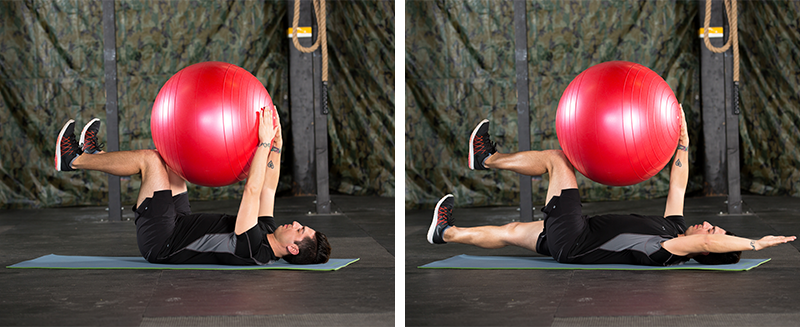
Focus: Core stability
How to Perform: Lie on your back and lift your knees to 90 degrees. Place a stability ball between your lower legs (near the knees) and press your hands and legs into the stability ball. Engage the core and draw the navel toward the spine. Extend the arms and legs—the straighter the limbs, the more challenging the pose. Make sure the knees stay at 90-degrees when returning back to center (the calves touching the hamstrings makes the exercise easier). Complete 10 reps on each side.
Regression: Perform the exercise without a stability ball, and keep your knees at 90 degrees as you lower. It’s similar to toe taps, but with the addition of the arms.
Forearm Plank With Toe Taps
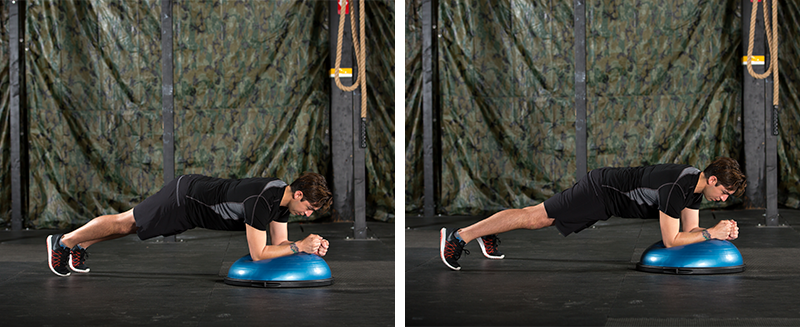
Focus: Core stability and hip strength
How to Perform: Position the body into a forearm plank with the feet touching. Begin alternating lateral toe taps, where the right foot pushes away from the body, touches the floor and then returns to center. Repeat with the left leg. Complete a set of 10 reps on each leg. Use a BOSU to make the exercise more challenging.
Regression: Perform a static forearm plank with feet hip-distance apart.
Side Plank With Torso Rotation
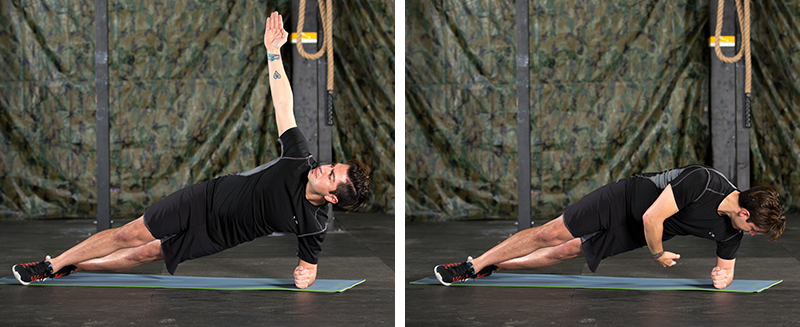
Focus: Core strength and shoulder stability
How to Perform: Position the body into a forearm side plank. Both legs should be extended. Lift the top arm over the chest and then rotate with your rib cage to draw the hand underneath the ribs. Repeat this motion for 10 to 12 repetitions and then perform on the other side.
Regression: Perform the exercise in modified side plank with your bottom shin on the floor.
Single-Legged Deadlift
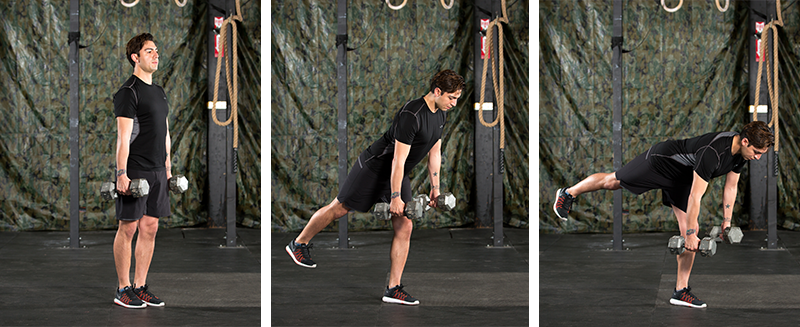
Focus: Posterior strength
How to Perform: Hold a set a dumbbells and stand tall with feet hip-distance apart. Lift the right foot off the floor; hinge the pelvis to glide over the top of the left leg. The head and the foot should counterbalance each other. The lowest hinging point should be when the body is parallel to the floor. Keep the pelvis as neutral as possible. Complete 12 repetitions on each leg.
Regression: Perform the exercise without dumbbells or complete a deadlift with both feet on the floor.
